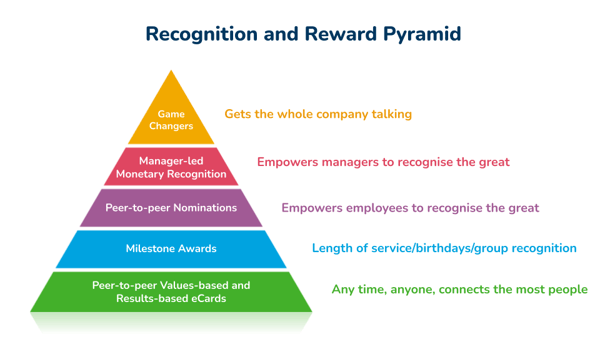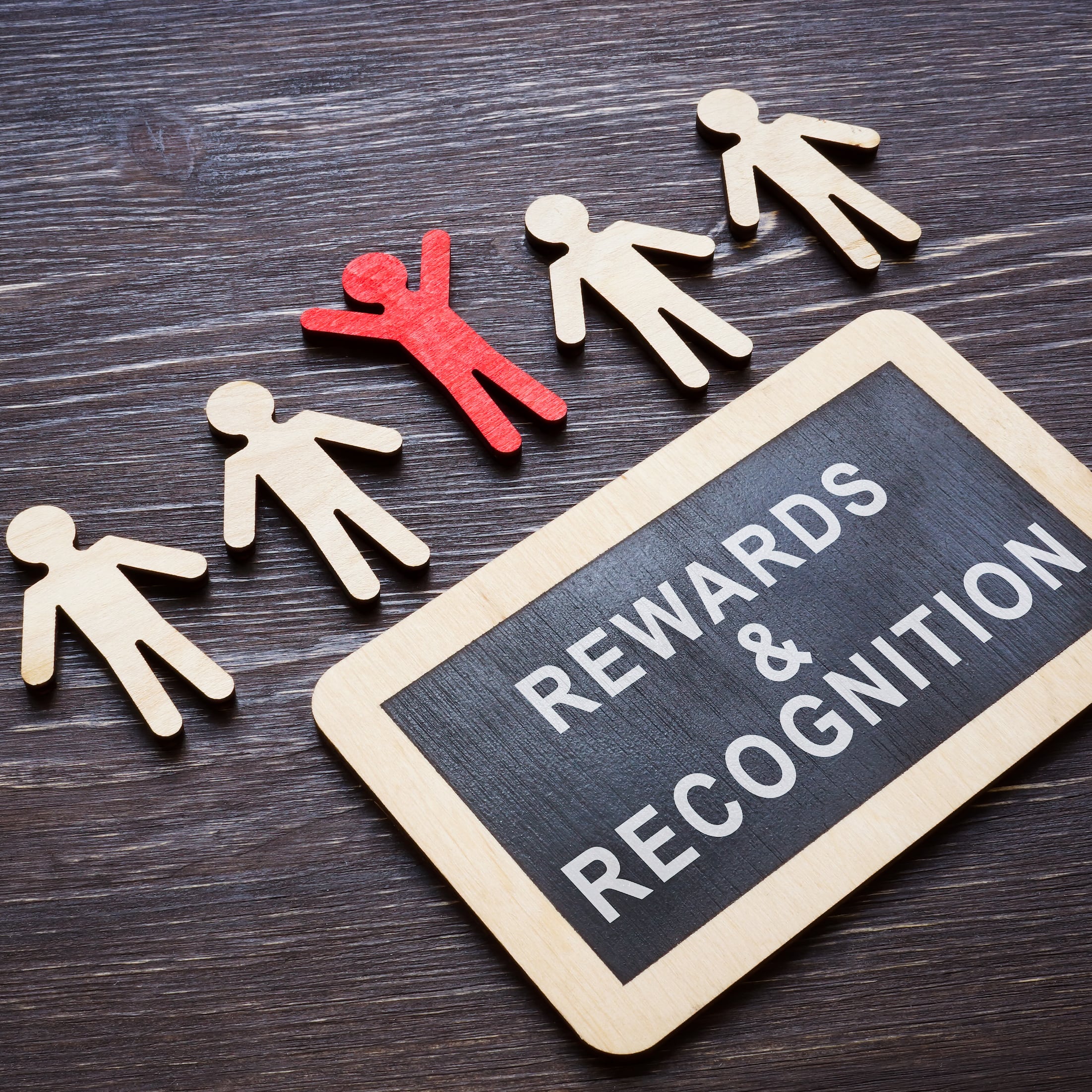Peer-to-peer recognition is one of the most impactful ways to improve employee engagement and increase motivation in the workplace. Everyone wants to feel appreciated and recognized for their work.
Let’s dive into the world of peer-to-peer recognition, explore why it works so well, how it can be incorporated into your broader recognition program and where to get started.
What is peer-to-peer recognition?
Instead of relying on top-down, manager-led recognition, the peer-to-peer approach focuses on creating an environment where colleagues show appreciation for each others’ contributions. It’s all about making individuals accountable for sharing the wins and telling the stories that eventually become office legend.
And while manager-led recognition is still very important, peer-to-peer recognition is 36% more likely to have a positive impact on the organization’s financial results.

Why is this type of recognition so powerful?
Despite regularly being overlooked for grand gestures or monetary rewards, peer-to-peer recognition has the power to improve culture, increase employee loyalty, and build company-wide connections. When used intentionally and strategically, this type of recognition is shown to fuel productivity, growth, and innovation.
The data is clear – employees who regularly practice gratitude are happier and feel better supported by others, which boosts their engagement levels and ultimately increases their job performance.
When an employee is recognized by one of their peers, they are 3x more likely to recognize someone else, creating a chain of positivity that boosts morale and job satisfaction. It’s a win-win situation.
They not only deliver the feeling I just mentioned, but they also bring together the power of pairing real-time recognition with real-time communications to help build strong and solid employee relationships.
Where does peer-to-peer fit into the broader recognition strategy?
After partnering with more than 4,500 organizations worldwide, we’ve learned a thing or two about the fundamentals of amazing reward and recognition strategies.
Our Recognition and Reward Pyramid (see below) sets out the essential components of a strategic recognition program. And the thing that creates the base of the entire pyramid? You guessed it: peer-to-peer recognition.
Peer-to-peer recognition, based on company values, is the foundation of any successful recognition strategy. It’s the thing that touches the most employees by promoting continuous recognition of those demonstrating the company’s values.
Once this solid foundation is established, the next levels of the pyramid can be built – including milestone awards, formal peer-to-peer nominations, and manager-led recognition.
How to build a peer-to-peer recognition strategy

Step 1: Lay the foundation
It’s important to start simple and begin with the groundwork – company culture. Building a collaborative culture that celebrates success creates an environment where employees are used to thanking each other, aligning their behaviour with values, and championing the successes of their colleagues. This is the foundation upon which your peer-to-peer recognition strategy will be built.
Lead by example by modeling the behaviors you want to encourage and regularly thanking colleagues for their contributions. And remember to encourage leaders across the business to do the same!
Your internal communications should also begin featuring great examples of employees who have demonstrated the company values, and you should start building a narrative around the power behind a simple “thank you.”
Step 2: Enable peer-to-peer nominations
Once the wheels are in motion to cultivate a culture of in-person recognition, the next step is to introduce a tool that enables employees to take peer-to-peer recognition to the next level. Having an accessible platform that allows colleagues to send eCards and submit nominations is a strategic way to put recognition in the spotlight and amplify its positive impacts.
Peer-to-peer recognition shouldn’t hide behind closed doors – when a “job well done!” or a meaningful “thank you” is sent and opened, others in the company should be able to participate in the moment of recognition and extend that conversation.
Public eCards that acknowledge success and allow employees to thank each other are fun and celebratory, continuous, and multi-directional.
Think about what you should name your recognition program, as you’ll use the same name and branding for the platform. The name should be meaningful, should stand out, and should still work in the long term. Make sure you also think about how well the program’s name reflects your company’s brand, values, and culture. A great example of embracing brand values is Dunelm and their eCards, which are awarded based on exhibition of those values.
Step 3: Define the award budget
After beginning to build your interactive peer-to-peer recognition platform, you’ll need to define a reward and recognition budget. While there is great value in non-monetary eCards as a no-cost recognition tool, the middle layer of the Reward and Recognition Pyramid is where peer-to-peer nominations and instant monetary rewards come into play.
The value of these rewards can vary, but something like £10-15 is a good place to start as it’s about the same as taking someone out to lunch or buying them a bottle of wine. Managers would usually have more flexibility and budget for their reward allocation, which gives them tools and autonomy to give recognition and reward when they see employees go above and beyond.
Step 4: Communicate
Remember, a recognition program is only as good as its comms plan. The same applies to your peer recognition plan – ongoing internal communication is key to its success.
Promote the program and encourage participation from the start. When you see eCards and employee nominations starting to come through, share some of the stand-out examples across your employee communication channels. Highlight award winners on the intranet, create an automated feed of eCard recipients on Slack, or display some top eCard messages on your office TV screens.

The aim is to use a multi-channel approach to support your culture of peer-to-peer recognition and keep the program front of mind. Don’t let employees forget that it exists after the launch comms finish!
Interested in learning more about how a peer-to-peer recognition program can support your business goals, and how to implement the four steps? Get in touch! A member of our team will walk you through how to tailor a recognition program to meet your company’s needs.

 Anthony Knierim
Anthony Knierim

